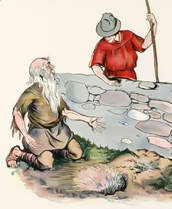 When I pastored a small church in north-central Iowa, I regularly did a children’s sermon. I used an object to provide a visual reference that I tied into the main topic of that day’s sermon. I found it interesting—and over time instructive—that after the services, the comments I received usually related to the children’s sermon. Even in a very literate and well-educated nation, we are still visual and oral learners at heart. As I shift from the first to the second parable in Matthew 25, let me simply remind you how important stories and illustrations are to effective communication. There is an Aesop Fable by the title The Miser that has been passed down from generation to generation. It goes like this: A miser sold all that he had and bought a lump of gold, which he buried in a hole in the ground by the side of an old wall. He went to look at it daily. One of his workmen observed his frequent visits to the spot and decided to watch his movements. He soon discovered the secret of the hidden treasure, and digging down, came to the lump of gold, and stole it. The miser, on his next visit, found the hole empty and began to tear his hair and to cry loudly with deep lamentations. A neighbor, seeing him overcome with grief and learning the cause, said to him, “Pray do not grieve so, but go and take a stone, and place it in the hole, and pretend that the gold is still lying there. It will do you as much good as the gold did. For when the gold was there, you owned it, but it did not benefit you, as you did not make the slightest use of it.” Aesop was a gifted storyteller who knew that simple stories could be understood and remembered by people who were living simple lives. Another masterful storyteller was Jesus of Nazareth. We call His stories parables—a Greek word we have brought into the English language that simply means, “to cast alongside.” A parable is a story that lays two things side-by-side for the purpose of comparing, contrasting, or explaining. We are currently focusing on three inter-related parables from Matthew 25—they speak to key principles of a Biblical Worldview. The first story talked about one of the most festive and important events in family life—a wedding. He used it to provide a picture of personal responsibility. The second story describes a business world event where an owner gives three employees a significant opportunity to improve and prove their work experience. He used it to describe effective stewardship. The story goes like this: For the kingdom of heaven is like a man traveling to a far country, who called his own servants and delivered his goods to them. And to one he gave five talents, to another two, and to another one, to each according to his own ability; and immediately he went on a journey. Then he who had received the five talents went and traded with them, and made another five talents. And likewise he who had received two gained two more also. But he who had received one went and dug in the ground, and hid his lord’s money. After a long time the lord of those servants came and settled accounts with them. Both Matthew and Mark point out how often and why Jesus used parables:
All these things Jesus spoke to the multitude in parables; and without a parable He did not speak to them, that it might be fulfilled which was spoken by the prophet, saying: “I will open My mouth in parables; I will utter things kept secret from the foundation of the world” (Matthew 13:33-34). And with many such parables He spoke the word to them as they were able to hear it. But without a parable He did not speak to them. And when they were alone, He explained all things to His disciples (Mark 4:33-34). Mark also points out that even though Jesus used real-life stories to speak of eternal spiritual truths, some people are still not willing to open their hearts and minds to God. After Jesus told the crowd the Parable of the Sower in which seed is sown on four different kinds of soil with four different responses, He then said, “He who has ears to hear, let him hear!” Mark goes on to record Jesus’ explanation for the three soils that did not produce grain, and then tells His disciples: To you it has been given to know the mystery of the Kingdom of God; but to those who are outside, all things come in parables, so that “Seeing they may see and not perceive, And hearing they may hear and not understand; Lest they should turn, And their sins be forgiven them” (Mark 4:9-12). Let me suggest that although we cannot control what people do after we share with them the good news, we do have control over how we communicate that good news.
May God fill your mouth with effective communications that He can then use to produce fruit. Yours in Christ, Mark R. Elliott, AMS
0 Comments
Leave a Reply. |
AuthorRetired in April 2022, Mark R. Elliott served as a Director of Missions (Associational Mission Strategist) in Western Iowa and Eastern Nebraska for almost three decades. He is a strong advocate for obedience and Biblically based disciple making. As such, he knows that making healthy disciples requires Christian leaders to be constantly pursuing spiritual maturity—be lifelong learners. Because of the time constraints of ministry, most pastors focus their reading list on resources that assist them in teaching and preaching the Word of God. As such, books focusing on church health, leadership development, and church growth tend to find their way to the bottom of the stack. With that reality in mind, Mark has written discussion summaries on several books that have helped him to personally grow in Christ and that tend to find themselves on the bottom of most pastor’s stack. Many pastors have found them helpful as they are able to more quickly process great insights from other pastors and authors. Archives
April 2022
Categories |
Looking for something? |
© COPYRIGHT 2024. ALL RIGHTS RESERVED.
|



 RSS Feed
RSS Feed
